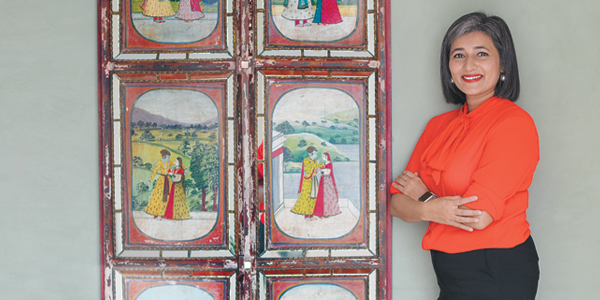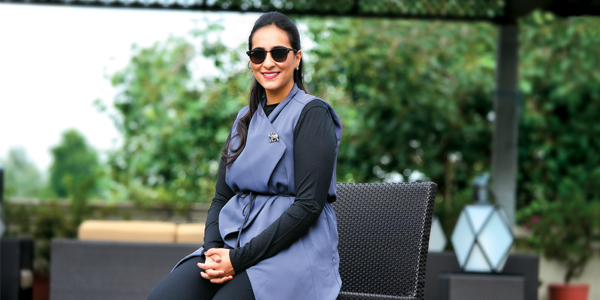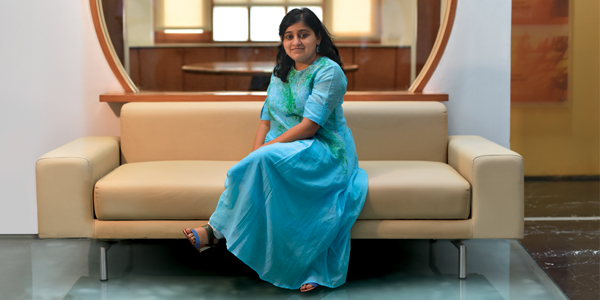“Heavy-lifter” Aakanksha Bhargava took over PM Relocations at 21, and exceeded even her family’s expectations with her rapid expansion
Aakansha Bhargava of PM relocations on how she successfully grew a business in a labour-intensive male-dominated industry
The year was 2007. “I was 21-years-old, alone in Bengaluru and setting up the PMR office in the city. In the midst of one assignment, the workers didn’t turn up. So, I drove to the tempo stand at night, all by myself, and picked up a few labourers to do the loading,” says Aakansha Bhargava, recounting her entrepreneurial beginnings. PM Relocations was actually founded by Bhargava’s parents Rajeev Bhargava and Archana Bhargava in 1985 in Kolkata, six months before she was born. But the credit goes to her for scaling up operations over the past ten years. “Our revenue back in 2007 was Rs.2 crore. This year, we are confident of closing with a revenue of Rs.65 crore,” says Bhargava. The number of workers has also grown from a modest 35 in 2007 to 535 at present. When Bhargava joined, the company was present only in two cities. Today, it is present in 14 cities including Bengaluru, Pune and Hyderabad. “My father did have confidence in me right from the beginning, but he probably thought that I could maintain the business at the same level. Even he didn’t think that I could bring it this far,” she says.
 Nascent Stage
Nascent Stage
Bhargava’s father decided to move his business from Kolkata to New Delhi in 1992, as Kolkata was fast losing its commercial centre status at the time. Her mother also joined in the business in 1994 when Bhargava was eight years old. It is, therefore, not so surprising when she says that she imbibed entrepreneurial values very early on as a child. “My father used to plan our vacations around his work. Summer holidays were never vacation time. For him, PMR came above everything. People preferred shifting homes on Sundays, and my father would never say no to anyone. When I was 10, he would take me to these houses on Sundays to conduct surveys,” says Bhargava.
Her mother managed the finance department, but still found time for her. “I never had the feeling that my mother wasn’t there for me. I participated in a lot of extra-curricular activities such as singing, swimming and learning musical instruments. There were no cab aggregators at that time, so my mother used to drop me to my classes on her bike, and then go back to the office. I learned a lot about work-life balance from her,” says Bhargava.
She finished her graduation in 2006 from Hindu College in New Delhi and, in 2007, completed her MBA from the SP Jain Institute of Management and Research in Mumbai. “I was always an extrovert. I was the president of the dance and drama school at Hindu and also the chief cultural officer for the culture fest,” she says.
Being so creatively inclined, her father never realised that she would be keen on pursuing a business that was labour intensive and unorganised. “He thought I would do something creative but his heart always wanted me to try out his business. I finished my MBA and chose not to be placed. At 21, I joined the office. Back then we were 35 people in New Delhi, Mumbai, and Kolkata,” Bhargava recalls.
She thought there would be formal training and handholding, but there was none. She says: “I expected him to sit with me and explain the business. But the first thing my dad asked me to do was to start filing out the 10 documents he gave me. He taught me that the way you archived your documents showed your commitment towards your work – that even such minor things mattered.”
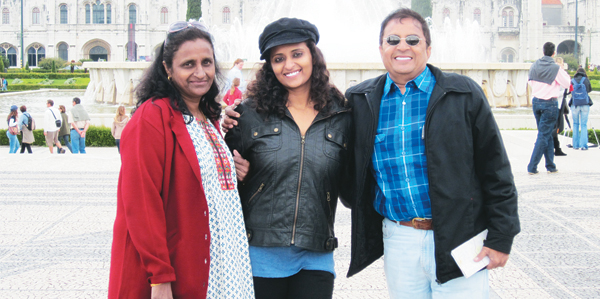
The relocation services industry was predominantly male-dominated when Bhargava jumped into the business, and it continues to be so. It wasn’t easy for her, she didn’t feel comfortable initially – and nor did she feel accepted. “At work, people assumed I would get married in a few years and leave. I wouldn’t be taken seriously when I would go for a meeting. I was very young, and people kept expecting ‘my boss’ or a male colleague to turn up,” she remarks.
She soon realised that she needed to do things herself, “otherwise I would never know whether I could really do it or not,” says Bhargava. So she packed her bags and moved to Bengaluru by July 2007 to set up a new office there all by herself. There were three other people with her at the office. Now, there are a hundred. Bengaluru would test her patience and entrepreneurial skills to the maximum. Her father though had faith in her. “While I was setting up the office in Bengaluru, I didn’t come home for nine months. My dad believed I could do it,” confesses Bhargava.
Accomplishments often rest on a foundation of challenges. Recounting a particularly trying time, she says, “In 2007, one of our peons was hit by a truck and died. A mob came to my office as a result. My father asked me if I needed him to come down, but I refused, telling him I would manage. And I did. There were several other similar challenges that came my way, which I managed on my own.”
During her 18-month-long stay there, she learnt the tricks of the trade. “I learnt how to find suppliers, how to hire people, how to find directions in a new city, and also the culture of the city along the way. I conducted my first sales call in Bengaluru. My first customer was the GM of Leela Palace, who is still a very good friend of mine,” she says. The recipe, she tells me, has been to travel, learn and understand the city and its culture. “In the relocation services industry, you enter a person’s home, so you need to care and be respectful.”
After Bengaluru, what came next for her was the setting up of a new office in Hyderabad. Her ever-expanding business has taken Bhargava to 34 countries across America, Europe, and the Middle East, where PMR, with the help of local partners helps clients relocate from different countries to India. Over the years Bhargava has learnt the art of thriving in a male-dominated bastion. “I feel if you respect others, they reciprocate. There have been situations where I have been the only woman among 40 or so men. But I know about my business, I have learnt packaging and know everything about it,” she says. Having said that, it took a while to convince people that a woman can work her way around trucks and warehouses.
Tumultuous times
Within six months of joining the company in 2007, she sensed that the company needed to take a lot more risk. It had been a Rs.2 crore business for too long. It needed to raise capital to expand. So, their only house was mortgaged to raise a loan of Rs.1.5 crore. “At the time of taking the loan, any other parent would have been cautious. But my dad told me, if you believe in it, you must do it,” says Bhargava. “That was quite a gamble. Thankfully, it paid off.”
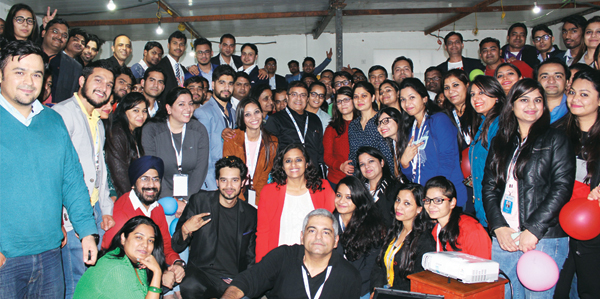
Bhargava was officially made CEO in 2012, and was riding a growth wave. However, on a certain day in 2013, that wave receded. PMR had a big contract between 2009 and 2013 with a global player that contributed majorly to the company’s growth. Due to a global realignment, that account was assigned to an international player. The business, close to Rs.10 crore and a third of its topline then, suddenly vanished. It halted company’s growth for two years. “It shook me. I was just 26. But I didn’t fire a single person. We pulled back by adding more clients,” says Bhargava. Not only that, she also managed to add over 30 clients in the next one year.
She feels that her balance and detachment to success or failure helped her sail through the crisis. “Intent is most important in a business, and so is accountability. Success and failure are very subjective, comes and goes,” she says.
The period between 2007 and 2009 saw a lot of struggle for the company. But it took off in 2009, when it cracked the global player’s account. Revenue scaled up to Rs.29 crore by 2013. Bhargava believes that while she spotted the market potential early on, the personal touch was needed to attract clients. “I travelled extensively to build my business. When you visit the customer’s office overseas and talk to the partner, they take you a lot more seriously as they see the effort behind your having travelled from a different side of the world to be there,” she says. For an entrepreneur, it is equally important to invest time and emotion in people, she feels. “I invest a lot in my people and that’s helped me fight the tough times.”
The relocations industry in India continues to be very unorganised. When it comes to organised players, there are companies like PMR and Agarwal. At the other end, every tempo and truck owner morph into a relocator. Bhargava feels that in this crowd, their differentiator has been the way the company handles clients and the personalised customer support they offer. Even as she has scaled up the company’s revenue from Rs.2 crore to Rs.65 crore in a span of ten years, Bhargava is far from satisfied with her laurels. “By 2020, I want revenue to be Rs.100 crore,” she boldly proclaims.









